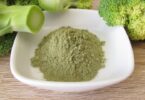In this post, I’ll be sharing my personal experiences and tips for dehydrating carrots in an oven or dehydrator or microwave.
From preparing the carrots to the best temperature and time settings, I’ll cover everything you need to know to get started on making your own delicious, homemade dried carrots
How to Dehydrate Carrots at Home
Dehydrating carrots in a dehydrator
Here is a simple process for dehydrating carrots in a dehydrator:
- Wash and peel the carrots, then slice them into thin rounds or thin sticks.
- Preheat the dehydrator to 135°F (57°C).
- Place the sliced carrots on the dehydrator trays in a single layer.
- Set the timer for 6-12 hours, depending on the thickness of the slices, and place the trays in the dehydrator.
- Check the carrots every few hours to make sure they are drying evenly. If some slices are drying faster than others, rearrange the trays to ensure even drying.
Remove the carrots from the dehydrator when they are totally dehydrated and crisp. Let them cool completely before storing them.
Dehydrating carrots in an oven
Here is a simple process for dehydrating carrots in an oven:
- Preheat the oven to the lowest setting (usually around 200°F or 95°C).
- Wash and peel the carrots, then slice them into thin rounds or thin sticks using a sharp knife or a mandoline.
- Line a baking sheet with parchment paper.
- Arrange the sliced carrots on the baking sheet in a single layer.
- Bake for 6-12 hours, depending on the thickness of the slices.
- Check the carrots every few hours to make sure they are drying evenly. Rearrange the baking sheet to achieve even drying.
Once the carrots are fully dehydrated and crispy, remove them from the oven and let them cool.
Dehydrating carrots in an oven will take longer than in a dehydrator since the oven may not be able to maintain a steady temperature as low as a dehydrator. Additionally, the oven door should be left slightly ajar to allow moisture to escape and prevent the carrots from becoming too soft.
SEE ALSO: How to dry vegetables in the oven
Dehydrating carrots in a microwave
I don’t recommend dehydrating carrots, as microwaves do not provide the consistent heat and airflow that is necessary for proper dehydration. This can lead to uneven drying and may result in the carrots becoming too soft or rubbery.
If you do not have a dehydrator or an oven, a better option for preserving carrots would be to pickle them, freeze them, or can them.
If you still want to try dehydrating carrots in a microwave, here is a simple process to follow:
- Wash and peel the carrots, then slice them into thin rounds or thin sticks using a sharp knife or a mandoline.
- Arrange the sliced carrots in a single layer on a microwave-safe plate, leaving a little space between each slice.
- Place the plate in the microwave and set the timer for 1-2 minutes on the highest power setting.
- Check the carrots after 1-2 minutes and continue to microwave in 30-second intervals until the carrots are fully dehydrated and crispy. This may take several minutes, depending on the thickness of the slices and the power of your microwave.
Once the carrots are fully dehydrated, remove them from the microwave and let them cool.
How to Store Dried Carrots
Once you have dehydrated your carrots, it is important to store them properly to ensure that they remain fresh and retain their flavor.
Here are a few tips for storing dried carrots:
- Cool the carrots completely before storing them. This will help to prevent moisture from forming inside the container, which can cause the carrots to become soft or spoil.
- Store the dried carrots in an airtight container. Glass jars with tight-fitting lids or vacuum-sealed bags are both good options.
- Keep the dried carrots in a cool, dry place. A pantry or a cupboard is a good choice. Avoid storing the carrots in damp or humid conditions, as this can cause them to spoil or become soft.
- Label the container with the date of drying and the expiration date (6 months from the date of drying).
By following these simple storage tips, you can help to ensure that your dried carrots remain fresh and flavorful for as long as possible.
SEE ALSO: How to store dried vegetables
FAQ about dehydrating carrots at home
How long are dehydrated carrots good for?
Properly dehydrated and stored carrots should remain fresh and edible for up to 6 months. However, the exact shelf life will depend on the humidity and temperature of the storage environment, as well as the freshness and quality of the carrots at the time of drying.
Do carrots need to be cooked before dehydrating?
Carrots do not need to be cooked before dehydrating. In fact, it is generally recommended to dehydrate raw carrots to preserve their flavor and nutrients.
Blanching the carrots before dehydrating may help to preserve their color and flavor, but it will also remove some of their nutrients. Dehydrating raw carrots is generally a better option if you want to retain as many nutrients as possible.
Should I peel carrots before dehydrating them?
It is generally recommended to peel carrots before dehydrating, as the skin can be tough and bitter, and may not dehydrate as well as the rest of the carrot. Peeling the carrots will also help to remove any dirt or impurities that may be present on the surface.
Do dehydrated carrots lose nutrients?
Dehydration can cause some loss of nutrients in vegetables, including carrots. However, dehydrated carrots can still be a nutritious snack or ingredient in recipes.
Dehydration removes water from the carrots, which can concentrate the remaining nutrients and flavors. This means that a small serving of dehydrated carrots can provide a similar amount of nutrients as a larger serving of fresh carrots.
However, it is important to note that some nutrients, such as vitamin C and some B vitamins, are sensitive to heat and may be lost during the dehydration process. Additionally, the longer the carrots are dehydrated, the more nutrients may be lost.
To help preserve as many nutrients as possible when dehydrating carrots, it is important to slice them thinly and dehydrate them at a low temperature for a short period of time.
Overall, dehydrated carrots can still be a nutritious snack or ingredient in recipes, but it is important to consume a variety of fruits and vegetables to ensure that you are getting all of the nutrients your body needs.





